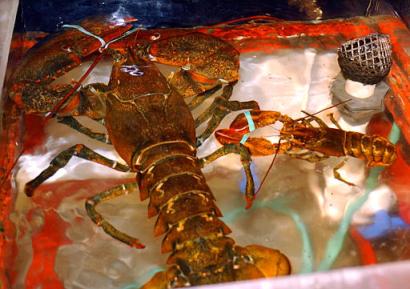March 31, 2005
3/31 - SB BRINGING MARK DOWIE TO L.A. & U.S.C. APRIL 20 in honor of Earth Day
"Is Environmentalism Really Dead?" This will be the subject of a talk and panel debate with Mark Dowie at U.S.C. on April 20, two days before Earth Day. For those of you who don't know him, Mark Dowie is a highly acclaimed investigative journalist, former editor of Mother Jones, and author of the Pulitzer Prize nominated book from 1995, "Losing Ground: American Environmentalism at the Close of the Twentieth Century." You may have heard me sing his praises here on the SB Blog over the past year as I still feel that "Losing Ground" provides the clearest assessment to date of "what happened" to the environmental movement.
It is a pivotal time for the movement, not just because of the collapse and disarray of the Democratic party (into which environmentalism has been sadly driven, in contrast to its more bipartisan roots thirty years ago), but also because of the numerous essays and critiques being offered up under the general title of, "The Death of Environmentalism" with the works of Shellenberger and Nordhaus, and Werbach leading the way.
I encourage everyone, if you're anywhere close to Los Angeles, to find the time on the afternoon of April 20 to join us for this very important talk and panel debate. The panel will include SB co-founder Dr. Jeremy Jackson and is guaranteed to be a lively event for which and audience of several hundred is expected. It is FREE and open to the public. Spread the word.

Just how dead is environmentalism?
3/31 - The definitive word on planetary health comes from WWF ... no, from the Millenium Assessment, no from . . . .
It's a frequent complaint from the public -- "why are there so many different voices, can't you people get together into a single voice." And I'm sure the answer from the defenders of environmentalism would be, "there is strength in diversity of voices." Whatever. Just a month or so ago WWF released its "Planetary Health Index" report. Now comes almost the exact same report from "The Millenium Assessment." Don't you kind of feel like the amount of resources that went into these two identical studies, if combined, could have produced something even greater? Or is that just unrealistic wishful thinking.
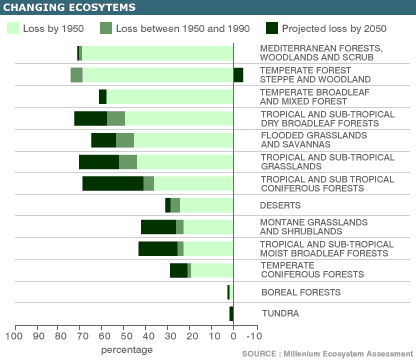
Going, going ... getting to be increasingly "gone"
March 30, 2005
3/30 - The Truth About the Greenpeace Stunt (and why we need what Greenpeace does)
So here's the straight scoop. Some of the Greenpeace folks contacted me a month ago about this most excellent fake menu stunt they had planned for the NOAA dinner last week, curious about my opinion of how it would play. I thought it sounded very well thought out and inspired. Not perfect, but ... well, listen folks, everyone needs to go read Malcolm Gladwell's new book, "Blink," to understand why we need more of what Greenpeace has traditionally provided. So I recommended to "go for it."
They went for it. They did it with a light-hearted tone, MOST everyone got a kick out of it and didn't take it to be an "educational" event, but rather a little piece of agitprop theater. Personally, I think it would have been one thing if they had come in and thrown blood on the tables of the NOAA administrators, BUT THEY DIDN'T. All they did was hand out funny fake menus.
I've been communicating with the Greenpeace folks this week to hear the feedback and it has almost all been fine. In fact, here is what one NOAA official wrote to them: "I was at the dinner last week! Hilarious stunt! Very funny, and unexpected. Brought a lot of levity to an otherwise serious meeting. Thank you!"
But as you could see from the Coos Bay World article, some people felt it was "unprofessional" (sheesh). So for those who have a problem with such an activity, here is a very gracious and detailed explanation of the event from one of the Greenpeace organizers:
Our purpose with the "menu of what's missing" was to provoke discussion and hopefully inject a little humor into a conference that had a tendency to get bogged down in struggles over the difference between guidance and guidelines. The menu was intended to be a shot across the bow, not a position paper, and deliberately raised as many questions as it answered.
The Coos Bay World article brings up a good point, in picking up on the classifications of "overfished" and "experiencing overfishing." We said that "due to years of overfishing, we probably won't be serving up Pacific Ocean perch, Tanner crab, Greenland turbot or rougheye rockfish," and Susan Chambers was correct to point out that neither NOAA nor the North Pacific Council has classified perch, turbot, or rougheye rockfish as overfished. Greenland turbot stocks have declined by more than 80% since 1972, however, and, as reported in the Cascadia Times, have dropped by more than half since 1990. Similarly, rougheye rockfish populations have dropped over 60% in the last 25 years.
The fact is that politics and conflicts of interest impact nearly every aspect of fishery management in the US, from the direction Councils provide to the Science and Statistical Committees to the makeup of the Councils and the management decisions they make - and how stocks are classified is no exception.
If we have to wait for the Councils or NOAA to classify fish stocks as overfished or experiencing overfishing before we can start talking about the need to do a better job of sustainably managing our marine resources, we're going to be in a lot of trouble.
![]()
And let me add one more comment in defense of Greenpeace. Last year I heard from a scientist with one of the world's largest environmental organizations who said, "If it wasn't for the occasionally radical actions of Greenpeace, we wouldn't be able to accomplish half of what we have in our struggles against long-lining."
And in a similar vein, I heard from one ocean conservationist yesterday who was at the NOAA banquet who said his discussions with the NOAA administrators about overfishing were strengthened by the fake menu stunt as it made him seem more rational by comparison.
Once again, this is why conservation groups need to collaborate and let certain groups do what they do best and appreciate them for what they are good at. And when it comes to attention grabbing stunts, Greenpeace has a long history of being the best.

What my acting teachers screamed at me in all my acting classes: "You're too caught up in your head, you think too much!" This is what Malcolm Gladwell would probably say to most environmentalists today.
3/30 - Salmon Farming 2-fer-1 Bonus: Farmed sea lice!
Who needs farmed shrimp when you can pluck your crustaceans off the
side of your farmed salmon. One man's sea lice is another man's
shrimp, right?
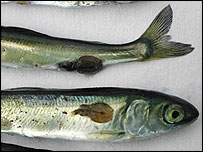
A little melted butter, a pair of tweezers and you're all set.
3/30 - The Greenpeace Stunt: Was everything on the menu overfished?
Looks like there may have been a little more to the Greenpeace banquet menu story of yesterday. According to an article in the Coos Bay World, four of the items listed on the Greenpeace menu as "problems" are not overfished species. Here's what they say:
But before Gilchrest addressed the audience, Greenpeace attempted to infiltrate the banquet. A handful of Greenpeace members, dressed as waiters and resembling the staff of the Omni Shoreham Hotel, distributed "menus" with copy titled "Mismanaging Our Nation's Fisheries: a menu of what's missing." They weren't menus at all. The pamphlets listed 11 issues of concern, such as problems with Atlantic cod, among others. They also listed Greenland turbot, Pacific Ocean perch and rougheye rockfish in the North Pacific, and albacore in the Pacific, as overfished species. But none of those species is considered overfished, according to current U.S. government criteria.
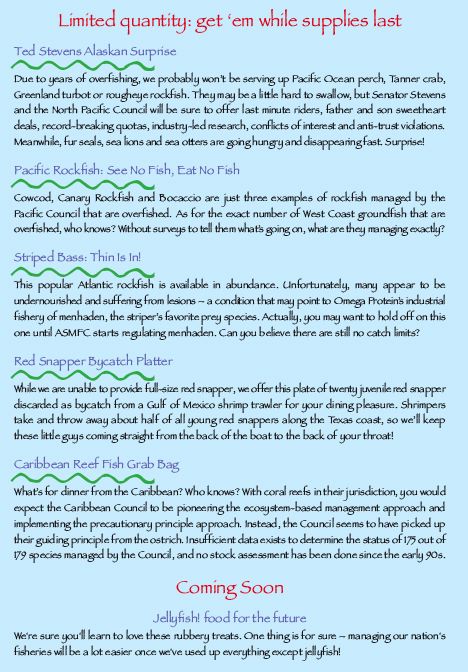
Greenpeace Menu, page 1
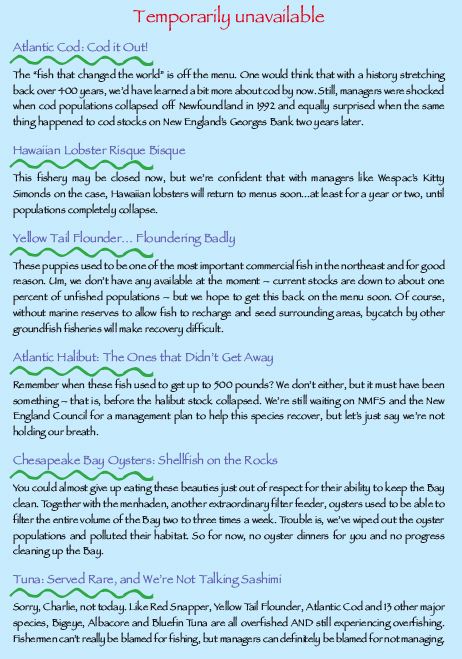
Greenpeace Menu, page 2
March 29, 2005
3/29 - The Chlorine Scene: In Yo Face with the Oceana Protest Dolphin
Not to be outdone by the Greenpeace/NOAA stunt, Oceana sent its Protest Dolphin to the streets in Baltimore at a meeting of chlorine manufacturers, calling attention to the "Nasty Nine" plants that produce the bulk of mercury contamination from that industry. Read about it on the Oceana blog.

Flippers of Intimidation: the Oceana Protest Dolphin
3/29 - How to Use "Celebrity Patrons" for the environment? The NY Times addresses the question
Here at Shifting Baselines we have a very firm philosophy on the use of "celebrity patrons" which is to "let entertainers do what they do best -- entertain."
Rather than having Jack Black look sincerely into the camera and say, "Won't you help me in my efforts to save the world's oceans," we had him dance around as the conductor of the Ocean Symphony PSA, and then later in the PSA we slipped in the animation of disappearing fish in the kelp forest. The net result -- two years later people still love watching the spot and it is still being aired around the country. No one ever complained about the celebrities preaching to them because ... we didn't have any celebrities preaching to anyone. They just used their entertainment skills to help call attention to the issue.
This is in contrast to back in the 1980's when people used to throw their shoes at their tv sets every time they saw Sally Struthers walking among the starving African children while begging you to help her out in her desperate mission. Preaching into the camera was something that got worn out in the 1980's. Today's audiences demand something a little more clever and indirect. One would hope that the environmental movement, in the midst of its "Death of Environmentalism" identity crisis, would be keeping this in mind as they continue to use celebrities, particularly after the substantial amount of Hollywood celebrity backlash in last year's election antics.
How many times do we have to say it, "The audience has changed." Here's an excerpt from yesterday's NY Times article:
Environmental groups have struggled with the appropriate use of celebrity patrons. In 2000, Leonardo DiCaprio interviewed President Bill Clinton for an Earth Day special on ABC, but Mr. DiCaprio's exclusive generated a storm of bad publicity. Journalists, including those worked for ABC, griped about an hour of prime time being turned over to a superstar advocate. Even more stinging were the show's low ratings.

Cameron Diaz, star and producer of "Trippin'"
March 28, 2005
3/28 - Why Greenpeace is tha' shiznit! (their fake menu stunt at the NOAA Fisheries dinner)
Oh, yeah! Take note all you ocean conservationists who thought entertaining forms of protest were a thing of the past. Last Thursday night in Washington D.C., as federal officials, members of Congress and fisheries industry representatives sat down for a dignified and elegant banquet banquet hosted by N.O.A.A., six Greenpeace activists dressed as waiters poured into the room and distributed fake menus titled, "Mismanaging Our Nation's Fisheries: A Menu of What's Missing" (you can download the entire menu on their website). And to keep things fun and happy, they released balloons that said, "Who Stole Our Fish?"
THIS is what the frequently dull world of ocean conservation needs more of -- well thought out publicity stunts that can capture the interest and imagination of the general public.
Nice job, Greenpeace!
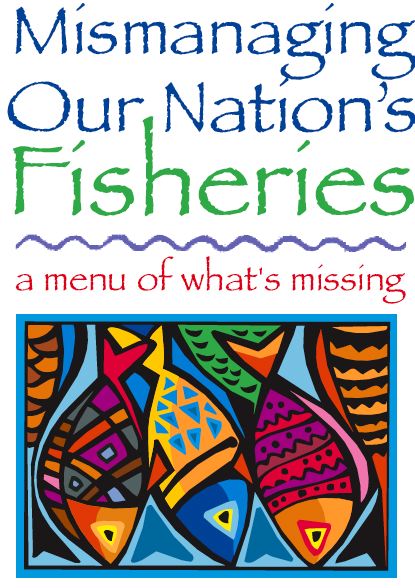
CREATIVITY: What ocean conservation needs more of!
3/28 - THE REAL OCEAN NEWS: Scharksch!
In case anyone has forgotten, this is what graced the cover of US News & World Report last August -- a leaping great white shark with the heading, "Mysteries of the Oceans," and nary a word about the so-called "ocean crisis" reported by Pew and the USCOP. And so here on the cover of The Sun is an article about great whites which, when you read the article, is about nothing more than some tourist dude who got into a shark cage in South Africa and guess what ... he saw a shark.
The point is, the general public would rather read a hundred more shark stories than even one beautifully written essay about the fate of the oceans. Nothing wrong with that. It's just essential that ocean conservationists realize this is the general situation and the gradient against which all ocean conservation communication efforts must swim.

If you have a great book on ocean conservation, you might want to put a
great white on the cover to sell more copies. Maybe even in the title,
like, "In a Perfect Ocean ... with lots of Great White Sharks!" Just
thinking of marketing.
3/28 - Quitting Florida Fishery Council Member says management is "a disservice to marine life"
After two terms on the Gulf of Mexico Fishery Management Council, James Fensom notified Florida Governor Jeb Bush that he's had enough. "The current regulatory process is a disservice to marine life in the Gulf of Mexico," said the Panama City lawyer and recreational fisherman, "And this is particularly true for the state of Florida."
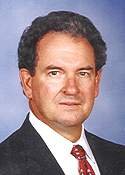
James Fensom: Had enough of fisheries regulation headaches in the Gulf
of Mexico.
3/28 - Is the U.S. Coral Reef Task Force Failing in their Mission?
They don't think so. An article this month in Science by lead author John Pandolfi says Florida's coral reefs are "well over halfway toward ecological extinction." They concluded that government efforts to protect coral reefs have been, "piecemeal and ineffective." But Andy Bruckner of NOAA said the article's criticism of efforts to protect reefs wasn't "entirely fair." Check out this article about it all in the Contra Costa Times.

This is your Florida coral reef, circa 2020.
March 25, 2005
3/25 - Time for Swimming Lessons: Preparing for sea level rise
Gurrgle, gurrgle. Glub, glub. The Christian Science Monitor tells you all you need to get ready for an ocean view in Kansas.
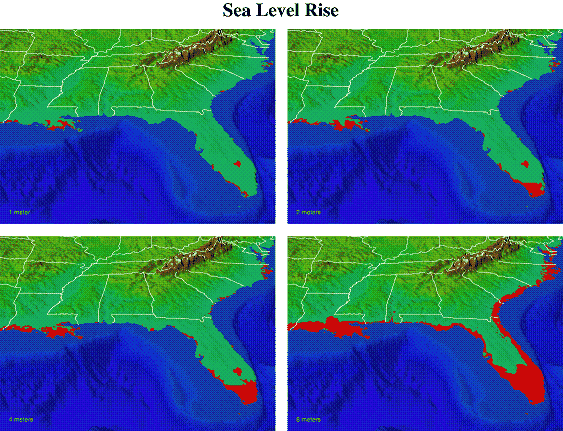
Sea Level Rise: One meter and the Florida Keys are little more than a
dive site.
March 24, 2005
3/24 - Virginia Coastal Oil Drilling: This is turning into whack-a-mole
The whack-a-mole analogy has been heavily used over the past year to describe fighting the enemy in Iraq. Well, its also getting to be appropriate for dealing with the Bush onslaught on the environment. Every time you turn around now they are pushing to reverse environmental protections (such as the Alaska oil drilling, rolling back air quality standards, etc.) that have been diligently constructed over the past 30 years. The Virginia General Assembly is now trying to slip in new legislation to allow drilling for natural gas and oil off Virginia's coast. Here's an editorial that summarizes the situation.

Coming Soon to the Virginia Coast?
March 23, 2005
3/23 - Fishwise & Sustainable Fishing: Is the point tipping?
At what point can you declare a trend to be a mass movement? The idea of sustainable fishing must be approaching that. Here's Fishwise, a website that gives a nice compilation of resources on the subject.

Fishwise: A program of sustainable fishery advocates
3/23 - Whaaa? If California fish resources are so bad, how can they be setting tuna catch records?
This is why the public has such a hard time figuring out the real story of ocean conservation. On the one hand we're implementing the Marine Life Protection Act because things are so bad, but on the other, the LA Times announces today that San Diego sport fishermen are catching record numbers of tuna. Yes, we know the scientific fine points here, but when it comes to communicating to the public, they're not interested in the details, only the headlines. From the article:
Fifteen tuna exceed 200 pounds, a trophy-class fish. In an extraordinary season, San Diego-based long-range boats, making runs hundreds of miles to waters off the Mexico coast, have averaged a dozen such yellowfin per trip. The Excel returned to Point Loma with a record 41 big ones in December.
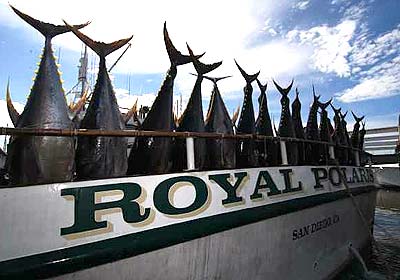
Come and get 'em: Record numbers of yellowfin tuna.
March 22, 2005
3/22 - Tales of William Ichthyo: New documentary on billfish
Here's the description of a new documentary on billfish:
The billfish documentary is about the billfish species— marlin, sailfish and spearfish— which draw millions of sports anglers to their waters around the world to engage in an always thrilling battle in which both can usually depart as victors. But despite their legendary strength and their eons of history in the planet’s oceans, these magnificent animals are vanishing. What’s happening to them and how they can be conserved is the subject of this enlightening and exciting made for television billfish documentary.

Billfish: the poster child for shifting baselines
3/22 - IMPAC 1: Aussies to host first MPA-palooza
While on the one hand we point out that the Sale et al. TREE paper last month (see blog post on 2/24) cautions against the "uncritical advocacy" of MPAs, we think its also important that American fishermen realize that MPAs are a "worldwide trend," as evidence by the plans for the first International MPA Congress. It's being organized for October in Geelong, Australia and they are expecting representatives of 65 -- that's SIXTY-FIVE -- nations to attend. Not saying that MPAs are right or wrong, just letting you know it is a major planetary trend you are looking at.

MPAs: Definitely a trend, definitely worldwide.
3/22 - Califorinia Ocean Battleground: Arnie vs. W., "Bring it on!"
El Presidente Bush is leading the oil charge into the Alaska Wildlife Refuge. The California coast is next on his radar screen. But the Governator says, "No way." Here's an excerpt from an article today in the Sacramento Bee' :
With fishery production dwindling by the thousands of tons, pollution pouring into the Pacific with every rainfall and development exploding on land within the coastal zone, the most pointed thrusts during Monday's sessions were aimed at federal lawmakers marking up a new federal energy bill that the members of the new council believe could make the state's ocean and coastal crisis worse.

Hasta la vista, Feds
March 21, 2005
3/21 - Jared Diamond's Variations on Shifting Baselines: "creeping normalcy" and "landscape amnesia"
Chad Nelson of Surfrider sent me this great excerpt from Jared Diamond, published in the Patagonia catalog:
Perhaps the commonest circumstance under which societies fail to perceive a problem is when it takes the form of a slow trend concealed by wide up-and-down fluctuations. Politicians use the term, "creeping normalcy" to refer to such trends and another term related to it, "landscape amnesia." In the case of Easter Island, one of my students asked once, "What did the Easter Islander who cut down the last palm tree say as he was doing it?" I suspect that landscape amnesia provides part of the answer.

Dr. Jared Diamond: Creeping normalcy (pretty much the same as shifting baselines) probably played a big part in the collapse of many societies.
3/21 - Navy to Enviros: Sure would like to avoid blasting marine mammals with sound, but...
Here's a good article in the Seattle P.I. about the losing battle over limiting sound damage of marine mammals. And here's an excerpt that pretty much tells why:
The Navy said it is committed to mitigating the potential effects of sonar on marine mammals, but active sonar is the only means of detecting modern diesel submarines, considered a serious threat to national security.
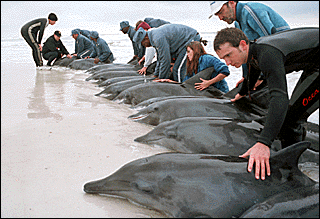
Marine mammal strandings: Increasingly linked to sonic disturbances.
March 18, 2005
3/18 - Klamath River, Oregon/California: A big, bad salmon story
It's farmers versus fishermen in this one. It's a major story showing how complicated managing nature is getting to be.
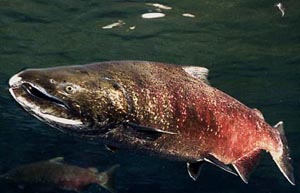
Chinook salmon: And its also ocean fishermen vs. river fishermen.
March 17, 2005
3/17 - Controversy: Bad for baseball, good for the oceans
Ya see, this is how it works. If you've got something that is working well and the public is highly engaged with it (i.e. baseball) then controversy (like the steroid scandal) is really a bad thing and there's reason to hide it from the public. But when you have something that the public is not taking an interest in (ocean conservation) and there are major problems that need public interest and support (so that governors don't cut $2 million from their state budget that was slated for marine life protection and the public doesn't even notice) then controversy is a good thing to help interest the general public.
Its a shame that so many ocean conservationists don't grasp this. They live in fear that letting the public know there are controversies will chase them away. It won't. And its in everyone's interest to present to the public BOTH sides of the issues, particularly the controversies between fishermen and environmentalists. The real problem is how few people know about the ocean issues and don't care.

When everyone is already interested, controversy is a bad thing, but that's not the case for the oceans
3/17 - Now THAT'S Entertainment: "Spring Break Shark Attack" Sunday on CBS
YES! At last a tv movie that gets it right. Off of Florida an artificial reef is constructed which inadvertently attracts hundreds of sharks, eating college students at spring break! Get yer popcorn ready.

The Truth About Ocean (entertainment) Decline
3/17 - Swift Boat Veterans and Death of Environmentalism: Is there a parallel?
I'm just sayin' ... just a little observation that has occurred to me as I line up our big Earth Day event at USC. We're bringing Mark Dowie, author of the Pulitzer Prize-nominated "Losing Ground" to town for several days, the highlight of which will be a talk at USC on Wednesday April 20 followed by a panel discussion of the recent Death of Environmentalism essays. I have now had 4 people from the large NGO's decline to be on the panel. Two of the large NGO's have published official rebuttals to the Death of Environmentalism and then proclaimed the issue dead and over, wanting to put it behind them.
But ... isn't that exactly what the Kerry Campaign tried to do with the Swift Boat issue last August? They came out with one quick statement, then said, "that's all we're gonna say, we don't want to dignify the critics with our attention." And guess what, the guy lost. And a lot of people pointed out what a losing strategy that was. And now the environmental movement just got clobbered over the head with Alaska drilling. Me thinks the Death of Environmentalism issue is a burning well fire that has not gone out and is not going to just go away on its own.

Hey, I've got a good idea, I'll run for president and just ignore the loudest group of my critics
March 16, 2005
3/16 - ALASKA OIL DRILLING: A black day for Environmentalism
For all the big NGOs who pound their chests over their great environmental victories, today is a day for them to hang their heads low and ask what's happened. I spent the summer of 1980 in Washington D.C. and followed the brilliant work of the Alaska Lands Coalition as twenty-some NGOs came together, formed a solid alliance, and secured the passage of the Alaska Lands Legislation. But the summer ended with clear warnings that the job of protecting Alaska would never end.
They were right. Twenty-five years later, in the midst of the "Death of Environmentalism" backlash essays, the environmental movement has faltered as the senate voted today to open the Alaska National Wildlife Refuge ("Anwar") to drilling. A dark day for the environmental movement without doubt.
And you know what else, last fall at the Surfrider 20th Anniversary I spoke with Lawrence Rockefeller who said he was headed up to Alaska this summer for the celebration of the 25 year anniversary of the passage of the Alaska Lands Act. Looks like they might want to postpone that little party.

Alaska Oil Drilling: Are we sure we need it?
March 15, 2005
3/15 - What We Be Sayin': The slow decline of Virgin Islands coral reefs (ugh)
It's our lenticular postcard, sadly brought to life in the real world. SB co-founding partner The Ocean Conservancy last week released a major report on the status of Virgin Island coral reefs. Over the past 25 years, the amount of live coral cover has declined from 40% to 20% according to the Virgin Islands Daily News' summary of the report.

A True Coral Reef Veteran: Dr. Sylvia Earle, who took part in Project Tektite 35 years ago in the Virgin Islands, gets ready to take a plunge with Ocean Conservancy Director Roger Rufe.
March 14, 2005
3/14 - The downside of environmental self-criticism: Dogpiling by a NY Times columnist
Did you ever play little league football and do some "dogpiling" -- where after the guy is down you jump on top of the heap of bodies just to feel like part of the process? I'm the last one to not think the recent critiques of the environmental movement by Shellenberger and Nordhaus, Werbach, Chapin and others are extremely valuable, justified, and important. But no sooner do you say its a healthy and potentially constructive thing to do a little self-criticism, then you get the "dogpile effect" with columnists like Nicholas Kristof of the NY Times jumping on the pile and sounding like the essays signal the end of environmentalism, rather than noting that Werbach's essay, "Is Environmentalism Dead?" ends with a question mark.
To get a clear idea of the many flaws in Kristof's editorial, read the Readers' Opinions Forum along with it in which one person after another expresses their disappointment with his editorial.
3/14 - US Oceans Commission Report Released TODAY: It's no 9/11 Report (why not?)
I know what you're thinking, "Of course the USCOP Report is not like the 9/11 Commission Report, how could it be, that was terrorism, this is fishies in the sea." But that's not what I'm talking about. As I have pointed out repeatedly, the 9/11 Commission pulled their head out and, even though virtually everyone in the U.S. was interested in their findings, they went ahead an allocated almost equal resources to the communication of their final report.
In contrast, almost no one in this country is interested in the state of the oceans (by "almost no one" I mean less than 5 percent of the general public which I guarantee you is the case). So you would think that the Commission in charge of the oceans would allocate even more resources to communicating their findings than the 9/11 Commission. But that's not the case. The report is being released with the standard belief of, "Everybody's dying to hear what we have to say. All we have to do is make it available at a website and the public will flock in."
Sorry to keep singing this tune, but it's true.
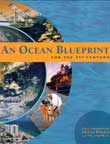
The 9/11 Commission Report was literally a best-seller. If you think it's naive to have that sort of aspiration for the oceans, you just may be part of the problem.
March 12, 2005
3/12 - Enviros Wake Up: Children are not spending time out in nature (duh)
As the old folks who run the environmental movement (motivated by the fondness of their childhood memories) worry about writing OpEds, taking out full page ads, and creating brochures, America is raising a new "media generation" who, in the future, will be more interested in creating theme parks that celebrate their favorite video games (which will be their fondest memories of childhood) than creating national parks. Just look at this report yesterday on the Internet Movie Data Base:
The average child between the ages of 8 and 18 now spends 6.5 hours a day with TV, the Internet, video games, radio, MP3 players and other media, according to a study released Thursday by the Kaiser Family Foundation and reported by Advertising Age. When children's multitasking is taken into account -- in which they are exposed to the content and advertising of two or more media at once -- their media engagement becomes the equivalent of 8.5 hours a day, more than the average workday of most adults. Commenting on the data, New York Senator Hillary Clinton urged advertisers to take it into account in producing commercials, and she joined a bipartisan group of colleagues who have reintroduced legislation calling for additional research into the impact of the media on children. She indicated that she was particularly concerned about the impact of violent images on TV, movies and video games on children.

8.5 hours/day for media, 6 hrs for school, 3 hrs for eating, 8 hrs for sleep, that leaves negative 1.5 hours for nature
March 11, 2005
3/11 - And then there's Reverend Jerry Falwell ...
The Hamster is one of our favorite websites here at SB. Check out this excerpt of quotes from the Reverend Jerry Falwell on the subject of global warming, which makes him vertiable bed fellows with Michael Crichton:
Q: Reverend Falwell, what is your opinion on the issue of global warming?
A: “I drive a GMC Suburban. And I have since the early ’70s. My wife drives one… I believe that global warming is a myth. And so, therefore, I have no conscience problems at all and I’m going to buy a Suburban next time.” [CNN, 11/20/02]
Q: But if global warming is a myth, as you say, what is the reasoning behind scientific experts who have stated that this phenomenon is a fact?
A: “The whole thing is created to destroy America’s free enterprise system and our economic stability.” [CNN, 11/20/02]
Q: And you really believe that the polluting practices of humans are having no effect on Planet Earth?
A: “It is God’s planet…and he’s taking care of it. And I don’t believe that anything we do will raise or lower the temperature one point.” [MSNBC, 12/3/02]
3/11 - Good Lord! Could Evangelicals (and crabbers) be saviors on the global warming front?
No less a news outlet than the NY Times thinks it sees a possible emerging pattern in American society -- that Evangelicals, 30 million strong, may be starting to believe global warming is an impending threat and its time to take it seriously. This is rather amazing. Here's an excerpt:
Mr. Cizik and Mr. Ball then asked Sir John to speak at a small meeting of evangelical leaders in June in Maryland called by the Evangelical Environmental Network, the National Association of Evangelicals and Christianity Today, the magazine. The leaders read Scripture and said they were moved by three watermen who caught crabs in Chesapeake Bay and said their faith had made them into environmentalists.
3/11 - RECREATIONAL FISHING DEBATE: Letters in Science on the Coleman paper
And in this corner, weighing in at ...
Last year's paper in Science by Coleman et al. infuuuuuuriated recreational fishermen. Now Mike Nussman, President of American Sportfishing Association, fires back with a letter to Science that begins by claiming Coleman et al. had suggested that "the overfished condition of marine fish stocks rests on the shoulders of recreational anglers."
Well, for starters, why did they even publish a letter that starts off with this accusation? That opening sentence mischaracterizes the Coleman paper from the outset -- it makes it sound like Coleman accused recreational fishing of being the ONLY source of over-fishing, which they obviously didn't.
Nussman goes on to say that yes, recreational fishing today for some species is significant, but the over-fishing problems are primarily the result of past and present commercial activities. Coleman et al. provide their reply, which is that while recreational fishing is not the only, and often not even the major, source of over-fishing, it is nevertheless important in many cases.
As a side note, I would like to say that Coleman's reply is similar to what I think I see and hear is the situation for the nearshore fishery of the Central California coast, which is that today's fish stocks for most species appear unchanged for the past 15 or so years, suggesting the fishing effort today is sustainable. BUT, the abundance of fish 15 years ago is far below what they once were. Which means the decision is: Do we want a sustainable rundown fishery, or a return to earlier levels?
Here's the letters about the Coleman paper: Download file
March 10, 2005
3/10 - How much bad press can longline fishing in the Pacific withstand?
Is the longline fishing industry in the Pacific being coached by the smoking industry? Here's a report that calls it a loss-loss situation for turtles and fishermen.
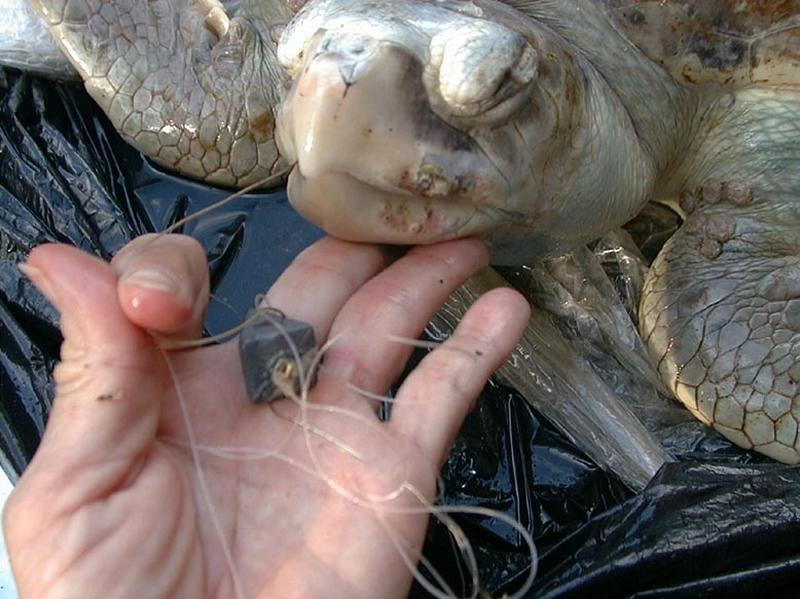
Longlining: Like the tobacco lobby?
3/10 - Public to Media in U.K.: "Running out of fish? Guess we better order more"
According to the British group Seafish, all the negative publicity about declining fish stocks has had little effect on the public's buying habits. Which might lead one to think that media exposure has no effect on society, until you look at things here in the United States of Lemmings where supposedly sales of pinot noir are up and merlot are down all because some balding dude in a movie expressed his opinions. The lack of media impact in Britain, according to this article, is probably because everyone now believes that fish oils are the secret to youth and beauty, and there's no stopping that freight train. Wait til a major study shows fish oils cause facial wrinkles. Every seafood joint in L.A. will go broke.

Fish Oils: Could this cause "the slut of fisk"?
March 09, 2005
3/9 - Up from the Sewage: SB Executive Producer Jason Ensler directs tonight's West Wing
There was a time, shortly after graduating from USC film school in 1997, that everyone in my class was floundering. I took advantage of this with Jason Ensler, hiring him to produce a 5 minute "promotional" video about the L.A. sewage treatment plant at Hyperion. He did a fantastic job with it (though you should have heard him complain about the smells out there). And fortunately, his career has climbed steadily upwards since -- tonight directing an episode of West Wing. But he retains his ties to his past through his continued role as an Executive Producer of Shifting Baselines.

Up from tha' shiznit: Tonight's episode of West Wing is directed by the same man who just six years ago was directing an educational video about the L.A. sewage plant.
3/9 - Pew & U.N.: Dead Zones continuing to increase in number
This week in Nature , an article pointing that the number of "dead zones" in the world's oceans continues to increase.
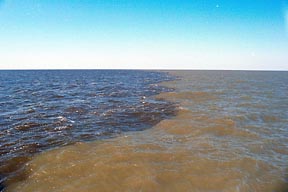
Dead Zones: at least 150 of them around the world
March 08, 2005
3/9 - The Slut of Fisk?
Update: Thanks to Jason Lefkowitz (see comments) we achieved translation and are now fairly certain the slut of fisk means "the end of fish."
En stor del av överfisket började faktiskt tidigare än på 50- talet? Det visade en uppmärksammad studie i den vetenskapliga tidskriften Science redan för två år sedan (läs mer på: http://albaeco.com/htm/artiklar/webbart/fiskehistoria.htm). Studien visade också att överfiske gör så att havsekosystemen blir mer känsliga för övergödning, klimatförändringar, invaderande arter och sjukdomar. Vi jämför alltså ofta med ett tillstånd i havsekosystemen som vi tror var “ursprungligt”, men som faktiskt redan det var väldigt påverkat av överfiske och andra mänskliga aktiviteter. Detta fenomen kallas “Shifting baselines” (läs mer på: http://www.shiftingbaselines.org)

Name that country: In this country, if you sell fisk you are a slut.
3/8 - Albatross: Do they have to go extinct to cause concern?
A month ago when I was in Morro Bay the local newspaper ran an article with a photo of a pelican wrapped in fishing line. There's no shortage of pelicans on the California coast and the fishermen told me this was a one in a thousand occurrence (but the photo makes for good copy).
In contrast, this article in the BBC says approximately 100,000 albatross died last year from longline fishing practices. That's enough to someday jeopardize the fate of the entire species.
3/8 - MAJOR NEWS for Caribbean Corals: NOAA proposes "threatened" status for acroporid corals
They are some of the most fragile corals in the Caribbean, not only easily broken up by storms, but also falling victim to disease. And their abundance has plummeted in recent years.
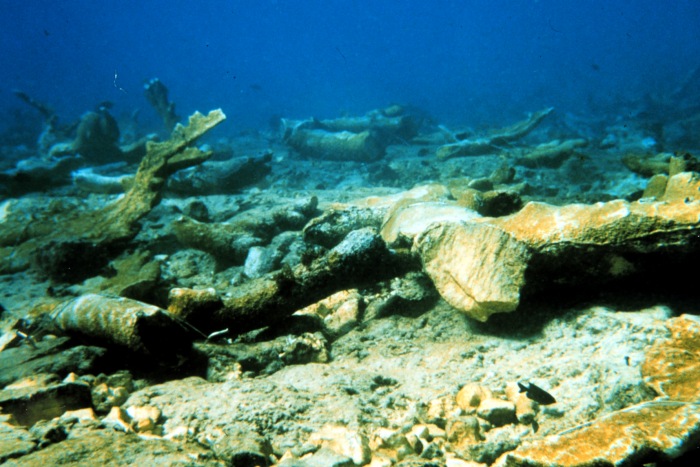
Elkhorn corals biting the dust
March 07, 2005
3/7 - Blogamosis: They're everywhere, they're everywhere
So last Thursday night Rob Cordry on The Daily Show did a great segment on "bloggers" -- all about how any chump in the world now can become a "journalist" just by opening up a website, developing a persona, and starting up their own "blog" (and one of those chumps would be me). And now this morning comes news in the NY Times that the first blogger has been added to the White House press corps. What does it mean? That the public is tired of polished, smoothed out, highly edited, highly contrived, highly schemed producing and packaging of "the news" and desperately seeks to hear "human voices" speaking directly and honestly from the source of events. Which is not a panacea, but certainly a good thing.

Invasion of the Bloggy Snatchers
3/7 - Cluetrain Manifesto Revelation: A MUST read
Last week Jason Lefkowitz posted a comment making reference to the Cluetrain Manifesto. I clicked on the link, was busy, and said to myself, "yeah, whatever, I'll check it out later." But yesterday, in yet another long winded phone conversation with Jeremy Jackson, I read the few paragraphs of text on their home page to him (not the 95 items) and suddenly, once read aloud, it all made blindingly clear sense. It is the essence of so much of what has been lost in the environmental movement -- namely "the human voice." And I would have to guess the loss of the human voice is the single biggest source of the current Werbach, Chapin, Shellenberger and Nordhaus (and many others) backlash against the environmental movement. And it made me realize why I have fought to keep our little Shifting Baselines project rough around the edges.

The Cluetrain Manifesto: Everyone needs to read it
3/7 - Bustin' Back tha Baselines: Historians are the key
Here's a nice little article about the work of maritime historians
whose mission it is to figure out just how much we have (or maybe
haven't in the case of some California marine mammals) ravaged the
oceans.

Marine Historian at Work: Matthew McKenzie of the Sea Education Association
March 06, 2005
3/6 - Records the World Doesn't Need: 47 surfers on one board in Oz
While the rest of the world ponders how to solve the AIDS crisis and achieve peace in the middle east, the Australians have been hard at work trying to push back the limits of surf physics.
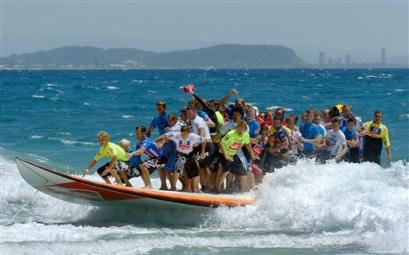
"Beauty, Jezzah. Wait'll they read about this in the States."
March 04, 2005
3/4 - Stupid Humans Kill Jumbo Lobster
Once upon a time, about a billion years ago, when I was a marine biology grad student, I was diving off Northeastern University's marine lab at Nahant, Mass. Down about 50 foot depth I saw what I thought was a car tire sticking out from under a rock ledge on the bottom -- it had the same arc of curvature as a tire. I grabbed it and pulled it out from under the ledge, and what came out was a gargantuan lobster. It was so huge that it didn't fight -- just seemed lethargic.
I swam him (turned out to be a male) to the surface and called to the guys in the boat, "MONSTER LOBSTER!" He eventually weighed in at 19 pounds. We put him in a tank in the lab and for two weeks took a vote on whether to eat him or send him back. Projections from lobster growth curves put his age at around 50 years. Aside from the fact that the meat of a lobster that large is like Goodyear tire rubber, it was also pointed out that large males do a disproportionately greater percentage of the mating, plus they probably have the best genes. So the vote was unanimous, after two weeks we tossed him back.
In contrast, twenty years later, some people this week proved they weren't quite as enlightened, and instead, after catching a similar sized lobster in Massachusetts (22 pounds -- maybe it was our old buddy!), decided it must go to a Ripley's Believe It Or Not museum, but before the hoopla could die down, the lobster died down, in Pittsburgh.
Lobstahs!
March 03, 2005
3/3 - Short Editorial: Oscars and Oceans
As you ponder the wisdom of all the time we spend at SB working on silly comedy (by the way, there's a new Groundlings short film in the works due for April, stay tuned), just take a look at this year's Oscars evening. The stuffy, white bread Motion Picture Academy (which by the way is what the USC undergrads I spoke with last fall thought the letters MPA stood for) went with black comic Chris Rock as the host.
So what happened? He brought the level of dignity down a notch, but they reached a bigger audience than last year and bucked the trend of declining audiences for award shows (Grammys and Emmys both took a big dive this year).
And he brought diversity. And he brought irreverence. And he brought humor. All the things that ocean conservation has traditionally lacked. And ... he brought a bigger audience ...
Chris Rock. Case in point.

Oscar Host Chris Rock: Just what the oceans need?
3/3 - Unshifting the Cod Baseline: New estimates show a 96% decline
Here it is. Exactly what we're talking about with "shifting baselines" in the real world. Rosenberg and Bolster have recalculated "the baseline" for cod. And they say:
"Instead of trying to rebuild fish stocks to levels held several decades ago, we should be trying to aim for the stocks' real potential 150 years ago," said Dr. Bolster, an associate professor of history at UNH. "Our decisions should reflect realistic goals for management, not just recently observed catch levels.
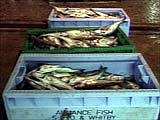
Finding the true baseline for cod.
3/3 - "To Persuade or to Crush": The sad track record of moveon.org
I don't like to delve into politics unless its relevant to mass communication of ocean conservation, which this is. In the fall of 2003 I was invited to a small gathering at a law office in Santa Monica where some of the heads of moveon.org showed their new commercials which were mostly constructed around the theme of "MisLeader" -- the first wave of what came to be known as "Bush Bashing" ads.
To the friends who invited me, when asked for my thoughts later, I said I couldn't see how the spots were seeking any sort of common ground through which people in the middle might be persuaded to join the cause. We all know what happened in the elections. And we know how "polarized" the nation is felt to be today. Now comes this article in Rolling Stone that formalizes the critique of moveon.org.
And this is relevant to ocean conservation, and fishing issues in particular. Should environmentalists seek to crush their opposition (and do they possess the innate ability to do it?), or should they search for areas of common ground through which people in the middle can be persuaded to join the cause?

Rolling Stone says, "If it was a stock, it would be broke by now."
March 02, 2005
3/2 - Ocean Change: Do we really expect "no change" as the norm?
As important as it is to understand change in the oceans, you also need to keep in mind the question of, "What is the null model?" Basically, what is "normal." Can we really say that what we expect is for nothing in the oceans to change?
This is an infinitely difficult problem. Honest to goodness, here, in today's news is one article about the oceans getting warmer, and another one about the oceans getting colder. It's getting to sound as bad as our Groundlings Senate Hearing on Coral Reefs film. The average reader has got to look at these two headlines and say to themself, "MAKE UP YOUR MIND."
The fact is they are both right -- one is overall global average temperature, the other is just about the deep sea. But still. The real problem is that in sensitizing everyone to "change," there is the serious risk that suddenly ALL changes becomes newsworthy. Which leaves you wondering whether what we're expecting is a world of no change in the oceans. Which would be kinda weird.
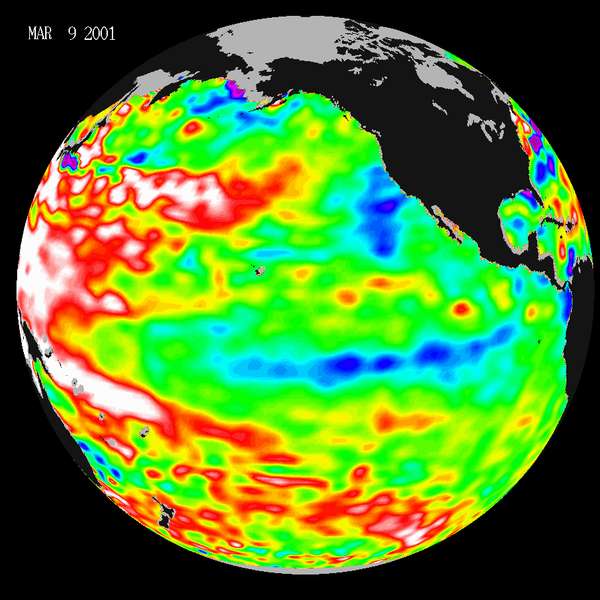
It's like the U.S.: Who's gonna win, the red or the blue?
March 01, 2005
3/1 - Another Record Month for SB Website: The time has come for "E-activist" positions
The release of the "Tiny Fish PSA Reply: Fishermen talk back," produced our first "Over 1000 Visitors" day on February 16 and brought the total traffic for the month to a higher level than January (the previous record month). The internet is an increasingly powerful mass communication tool for ocean conservation. Oceana has proven itself to be a leader in grasping this, particularly by appointing Jason Lefkowitz as their "E-activist," who does a very effective job of generating valuable communication through the internet. It's time for every ocean conservation organization to have the position of "e-activist" as a standard part of their staff, no longer a novelty. If your group doesn't have this position, you might want to ask why.
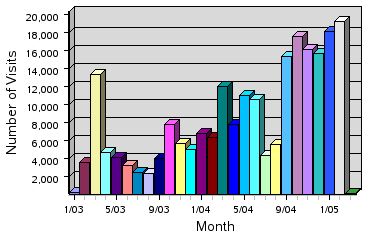
Onward and upward (and downward): bringing you bad news and comedy for the oceans
3/1 - Metrics? We don't need no schtinking metrics
How do you quantify "the metrics" of the e-mail below which I received yesterday? Here at SB we're not real big on believing in metrics (I've heard too many stories of Hollywood movies that "tested through the roof" then flopped). Instead, we believe in believing (and we love hearing the number crunchers groan over that statement). We believe there are lots of good people out there who come across the media we produce (slide shows, PSAs, short films, lenticulars, etc.), are inspired by them, and put them to good use in helping to communicate the issues in the oceans. Yet you just can't quantify that process.
Yes, it's an old fashioned way of thinking (maybe even used to be the prevailing way of thinking in the environmental world before the advent of corporate concepts like "return on investment") but we actually believe in people more than numbers.
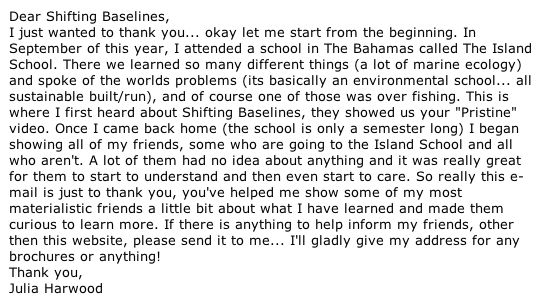
The Age Old Question: How do you quantify "inspiration" like this for the bean counters?
3/1 - "Drop the snails and raise your hands!" California's first "Tidepool Cop"
Wish it were funnier than it is. Just talk to the old timers from La Jolla and Del Mar, California. They are in disbelief at how much ocean life has been stripped from the seashore. And look at this excerpt from the article yesterday in the Monterey Herald:
In Laguna Beach, tidepool violations are No. 1. In 2003, 28,025 potential tidepool violations were reported in Laguna Beach. In contrast, there were 11,000 calls about dangerous surfing, 4,000 complaints about dogs on the beach and 1,500 calls for public drunkenness.

New Rule: Steal a snail, go to jail.
